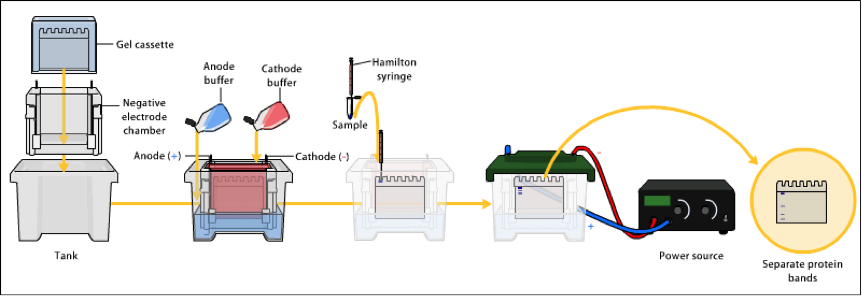SDS-PAGE Based Protein Purity Analysis Service
Sodium dodecyl sulfate polyacrylamide gel electrophoresis (SDS-PAGE) is a technology commonly used in protein purification and analysis. SDS-PAGE can separate proteins according to the differences in the charge and the different mobility due to different molecular sizes. If the protein sample has been highly purified and contains only one protein, the results would show a single protein band after SDS-PAGE separation. However, when there are multiple proteins in the protein samples, different proteins can be separated into multiple protein bands through SDS-PAGE. Therefore, SDS-PAGE technology provides a direct way to analyze the purity of protein samples. To meet the research needs of analyzing the purity of protein products, MtoZ Biolabs has developed and optimized a SDS-PAGE based workflow, and provides an accurate analytical service for protein/peptide purification study.
SDS is a type of anionic surfactant that can break the hydrogen and hydrophobic bonds in proteins. SDS can bind to proteins in a certain proportion to form SDS-protein complexes, covering the intrinsic charges of proteins. Therefore, the migration speed of all kinds of SDS-protein complexes is only determined by the molecular weight of proteins. Different proteins are separated by SDS-PAGE electrophoresis, followed by protein staining and analysis of protein bands.

Figure 1. SDS-PAGE Analytical Workflow
Analysis Workflow
1. Determination of Protein Concentration
2. Sample Preparation
Add 2x loading buffer (5% β-ME) and boil sample for 10 minutes.
3. Electrophoretic Preparation
Gel production, installation of the electrophoretic tank, and preparation of electrophoretic buffer.
4. Protein Samples Loading
According to the protein concentration, take an appropriate amount of processed protein samples and add into the pocket of the gel. After loading all samples, add protein standard marker into the first or last pocket of the gel.
5. Electrophoresis
Turn on the power supply, adjust the voltage to 100V, and run the gel the constant voltage.
6. Gel Staining
At the end of the electrophoretic separation, staining with R250 stain for 1 hours, followed by destaining of protein gel until background become clean and clear.
7. Analysis of Purity and Molecular Weight of Protein Samples
Deliverables
1. Experiment Procedures
2. Parameters of SDS-PAGE
3. Protein Purity Results
4. Bioinformatics Analysis
Related Services
Identification of Biopharm
Variation Analysis
Purity Analysis
How to order?







